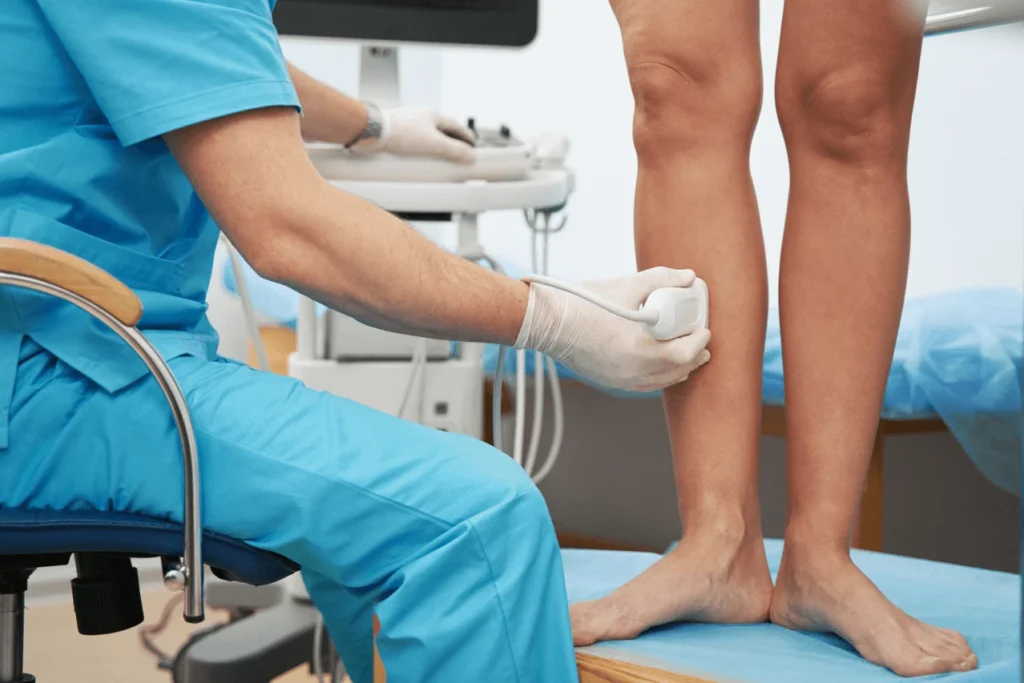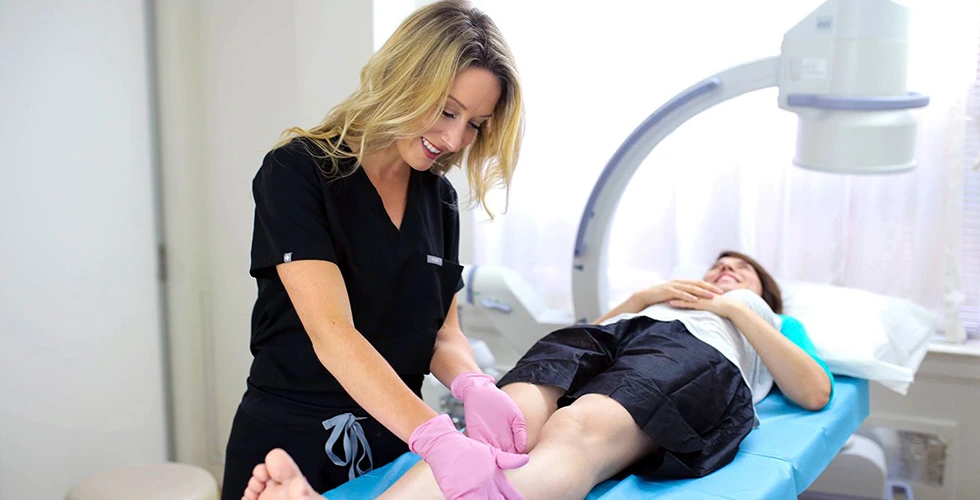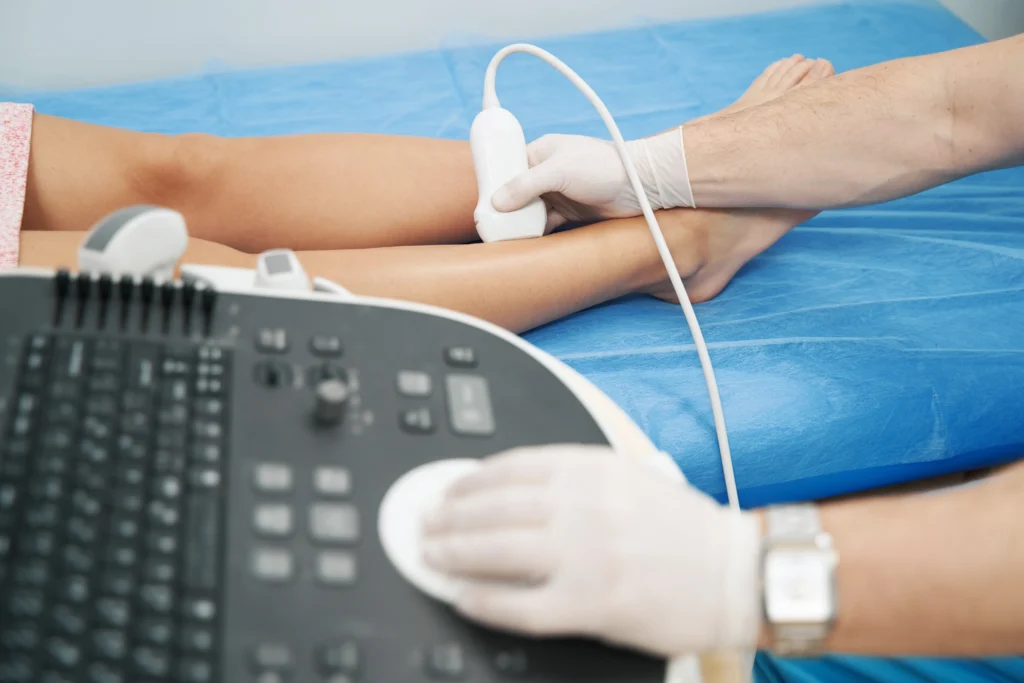What is the VNUS Closure Procedure?
The VNUS Closure procedure is a minimally invasive alternative to traditional vein stripping procedures. If you have varicose veins or underlying chronic venous insufficiency, the vein doctor can perform a VNUS closure to destroy the diseased saphenous vein responsible for your vein problems and reroute the accumulated blood into healthier leg veins.
During VNUS Closure, the vein doctor administers local anesthesia to numb the skin’s surface and make a small incision. The incision is an entry point through which a specialized catheter is driven into the diseased saphenous vein under ultrasound guidance. Once the catheter is lodged within the diseased vein, the vein doctor delivers a combination of anesthetic and saline to protect the surrounding tissues. The catheter is finally activated to generate radiofrequency waves, which destroy the diseased vein’s walls, turning it into scar tissues eventually absorbed by the body. The accumulated blood reroutes into healthier leg veins, restoring optimal blood circulation to the heart.
The VNUS closure procedure treats chronic venous insufficiency, the root cause of most vein problems. This procedure is suitable for patients with spider veins, varicose veins, leg heaviness, restless leg syndrome, frequent leg cramps, leg swelling, leg ulcers, deep vein thrombosis, and other symptoms of vein disease.

Benefits of VNUS Closure
VNUS closure, also known as radiofrequency ablation, is the ideal alternative to traditional vein stripping procedures. It’s a minimally invasive procedure that concludes within an hour and involves minimal post-treatment side effects, a negligible risk of complications, and a nearly perfect success rate. Furthermore, there’s no downtime after VNUS closure, which means you can resume your daily activities and work immediately after your VNUS closure procedure. You don’t need to take any time off work.
Drawbacks of VNUS Closure
VNUS closure is an extremely painless and comfortable procedure that concludes within an hour with no downtime. The side effects of VNUS closure are minimal. But one of the potential drawbacks of VNUS closure is the risk of nerve injuries. The vein doctor generates radiofrequency energy to burn and ablate the diseased saphenous vein, thus rerouting the accumulated blood into healthier leg veins. But if the vein doctor isn’t experienced enough, there’s a small risk of nerve injuries.
Is VNUS Closure Covered by Medicare?
VNUS closure is covered by most medical insurance providers because it’s considered to be a medically necessary procedure. The VNUS closure procedure treats chronic venous insufficiency, which is a dangerous medical condition with numerous long-term consequences. That’s why VNUS closure treatments are usually covered by Medicare and most other medical insurances. Our vein clinics in Maryland also provide free insurance verification before your appointment — you can schedule an appointment to claim free insurance verification.
How Much Does VNUS Closure Cost?
The specific cost of the VNUS closure procedure depends on your unique condition and goals. The vein doctor will identify the location and size of your diseased veins, whether you have superficial varicose veins, and other factors, based on which they will curate a thorough overview of your VNUS closure cost. Our vein doctors in Maryland provide a complete overview of your vein treatment costs with and without insurance coverage before the treatment.
The Vein Clinic in Maryland is led by board-certified and Harvard-trained vein doctors specializing in the latest minimally invasive spider vein and varicose vein treatments. Our vein doctors always provide minimally invasive procedures instead of traditional vein stripping and surgical procedures, ensuring optimal results with no downtime. If you have spider veins, varicose veins, or other signs and symptoms of vein disease, please contact our vein doctors.
What is the VenaSeal Procedure?
The VenaSeal treatment is a minimally invasive procedure for chronic venous insufficiency. This is a suitable alternative to radiofrequency ablation, but it’s just as effective and safe. VenaSeal also treats the root cause of spider veins and varicose veins, making it a suitable procedure for patients with spider veins, varicose veins, leg heaviness, and other symptoms.
VenaSeal essentially involves injecting a super glue for varicose veins to seal their walls shut. The vein doctor makes a small incision on the skin’s surface to insert a catheter into the diseased vein and deliver a medical-grade adhesive. The vein glue seals the diseased vein’s walls shut, turning it into hardened scar tissues eventually metabolized by the body. The accumulated blood reroutes into healthier leg veins, restoring optimal blood circulation to the heart. VenaSeal is one of the latest minimally invasive vein treatments, having received FDA approval in 2015.
Benefits of VenaSeal Treatment
The VenaSeal treatment has a nearly perfect success rate and a negligible risk of complications. It’s a painless procedure that concludes within an hour, following which you may resume your daily activities and work. The post-treatment side effects are mild and temporary. You may resume your daily activities immediately after VenaSeal treatment, ensuring optimal results without harsh complications.
Drawbacks of VenaSeal Treatment
VenaSeal is a relatively new vein treatment. Since it was only approved in 2015, it isn’t backed by decades of clinical research, so its long-term effects are still unknown. VenaSeal also leaves a medical implant in your body. The superglue for varicose veins hardens and stays in your body. It doesn’t cause any harm, but some people have an emotional discomfort with the prospect of a medical implant.
VenaSeal Complications
VenaSeal involves a negligible risk of complications. In fact, this is one of the only minimally invasive procedures that doesn’t involve a risk of nerve injuries because it doesn’t burn the diseased saphenous vein. Our vein doctors also ensure you don’t have an allergic reaction to the medical glue used for this treatment.
Is VenaSeal Covered by Medicare?
VenaSeal was only approved for vein treatment in 2015, so it’s not yet covered by all major insurance providers. However, we can perform an insurance verification to determine if you can receive any coverage.
How Much Does VenaSeal Cost?
The cost of VenaSeal depends on numerous factors, including your specific symptoms, condition, diagnostic results, and other factors. Our vein doctors provide a complete breakdown of your treatment cost before the VenaSeal treatment.
Don’t ignore your symptoms.
At Vein Treatment Clinic, we’re here for Maryland patients with expert vein doctors and convenient locations close to home.
Whether you’re in Bethesda, Bowie, or Maple Lawn, you’ll find advanced care for spider veins, varicose veins, and chronic venous insufficiency at our clinics.
Patients across Maryland trust our Ivy League–trained, board-certified specialists for minimally invasive treatments that improve circulation, relieve pain, and restore confidence. In Maryland, our team includes Dr. Kamran Saraf and Dr. Lisa Alford, two highly experienced vein experts dedicated to providing personalized care.
Book your consultation today at the clinic nearest you.





